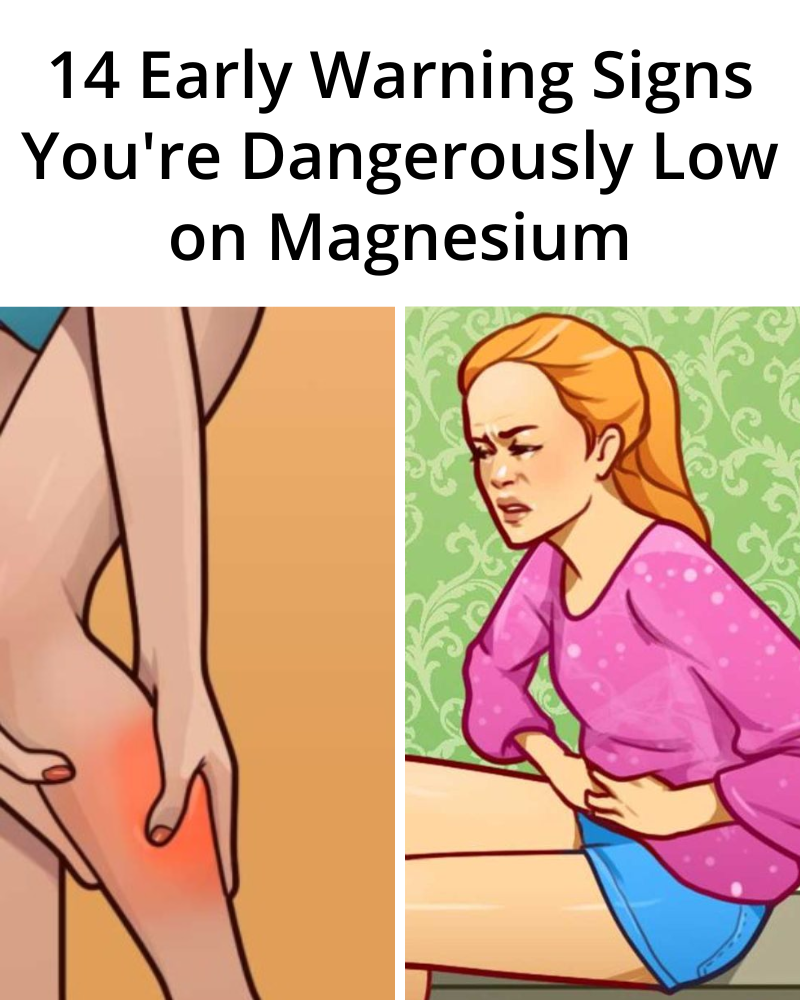
Magnesium is a vital mineral that supports more than 300 biochemical functions in the body—from producing energy to maintaining muscle and nerve health, regulating mood, and strengthening bones.
Yet despite its importance, magnesium deficiency is surprisingly widespread. Poor diets, depleted soils, and certain medical conditions often leave people unknowingly running low on this essential nutrient.
Here are 14 early warning signs that your body might be running dangerously low on magnesium:
1. Muscle Cramps or Twitches
Low magnesium can cause involuntary muscle spasms, like leg cramps, eyelid twitches, or painful “charley horses.”
2. Constant Fatigue
Since magnesium helps generate cellular energy, not having enough can leave you feeling drained, even after rest.

3. High Blood Pressure
Magnesium relaxes blood vessels, so low levels can contribute to elevated blood pressure—even in otherwise healthy people.
4. Irregular Heartbeat
A deficiency can disrupt your heart’s electrical signals, leading to fluttering, palpitations, or skipped beats.
5. Anxiety or Mood Swings
Magnesium helps regulate calming neurotransmitters like GABA. Without enough, stress and irritability can spike.
6. Insomnia or Trouble Sleeping
Magnesium supports melatonin production and relaxation. If you struggle to fall or stay asleep, a lack might be to blame.
7. Frequent Headaches or Migraines
Magnesium helps control blood flow and inflammation. Low levels can lead to recurring headaches or intense migraines.

8. Bone Pain or Weak Bones
Working alongside calcium and vitamin D, magnesium is key for bone health. A deficiency can lead to pain, fractures, or brittle nails.
9. Constipation
Magnesium helps move things along in your digestive tract. Too little can slow digestion and cause hard, infrequent stools.
10. Brain Fog or Memory Issues
Low magnesium can affect cognition, making it harder to concentrate or recall information.
11. Numbness or Tingling
This mineral supports healthy nerve function. Deficiency can cause pins-and-needles sensations in the hands, feet, or face.
12. Extreme Tiredness After Exercise
Struggling to recover or feeling wiped after mild workouts might be a sign your muscles aren’t getting the magnesium they need.

13. Hormonal Changes
Magnesium plays a role in regulating hormones. Deficiency may lead to PMS, irregular cycles, or worsened menopause symptoms.
14. Chocolate Cravings
Craving dark chocolate might actually be your body’s way of asking for magnesium—it’s one of the richest natural sources.
How to Replenish Magnesium Levels
1. Eat More Magnesium-Rich Foods:
Include leafy greens, nuts, seeds, legumes, whole grains, avocado, and dark chocolate (70% cocoa or more) in your diet.
2. Consider Supplements:
Magnesium citrate (great for digestion), glycinate (for sleep/anxiety), and malate (for energy and muscles) are all good options. Always talk to a healthcare provider before starting—300–400 mg/day is typical for adults.
3. Try Epsom Salt Baths:
Magnesium sulfate can be absorbed through the skin, helping to relax muscles and restore levels naturally.

4. Avoid Magnesium Drainers:
Cut back on alcohol and excessive caffeine, and try to manage stress, all of which can deplete magnesium stores.
5. Get Tested:
If you notice several symptoms, ask your doctor to check your magnesium levels. Keep in mind, regular blood tests may not catch deficiencies inside cells, so discuss other testing options if needed.
Final Thoughts
Magnesium deficiency often flies under the radar because its symptoms can mimic other conditions. But if you’re noticing several of these signs, it might be time to take action.
A few simple lifestyle changes—like eating more whole foods, managing stress, or supplementing—can make a big difference in how you feel, both mentally and physically.



